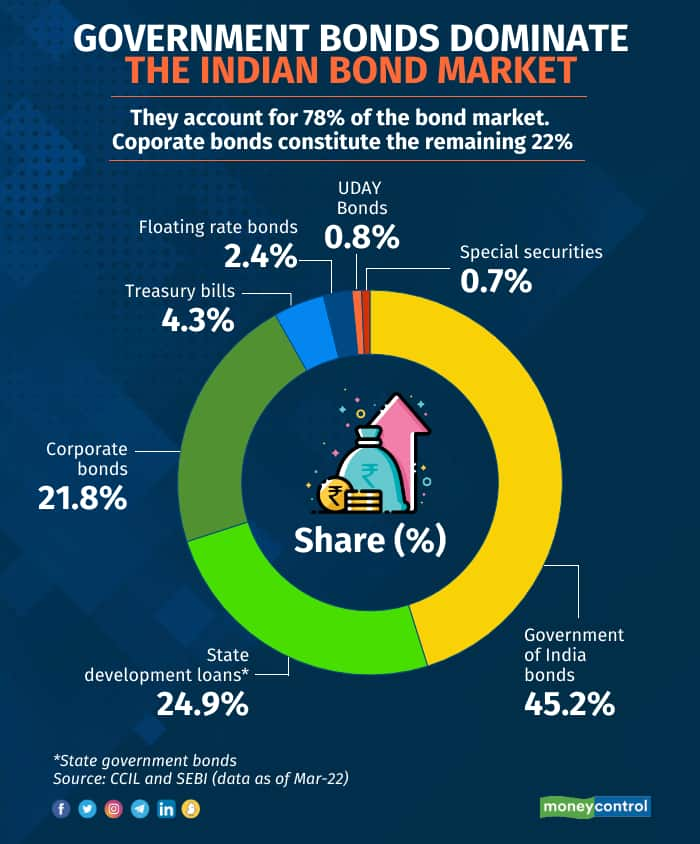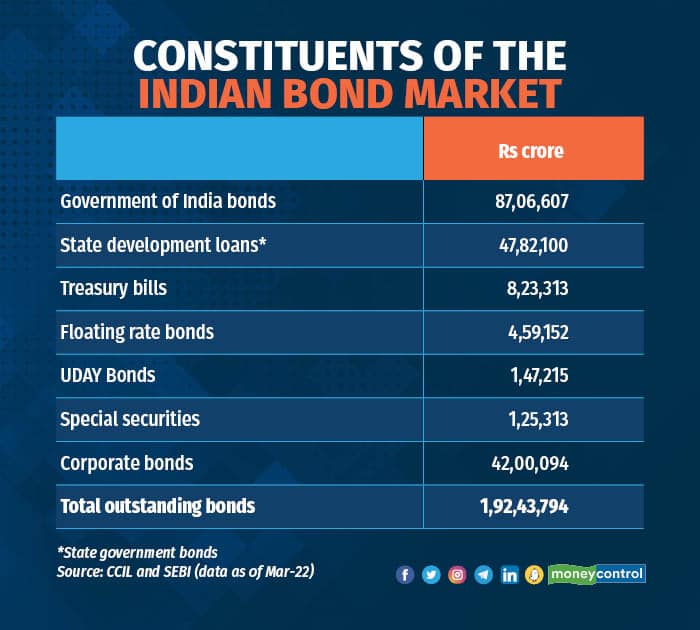



The Indian debt market is fairly large, with the bond market presently sized at around $2.34 trillion. Of this, $1.83 trillion is dedicated to government bonds, while $510 billion is allocated to corporate bonds (as of Mar-22, Source: CCIL, SEBI). Government bonds constitute 78% of the overall outstanding bonds in the country, while corporate bonds account for 22% of the market. Over the past five years, starting from March 2018, the total outstanding bonds have witnessed a remarkable growth of 77%, with government bonds experiencing an 85% rise and corporate bonds increasing by 53%.
The presence of a robust bond market makes it easier for governments and corporations to raise funds in a cost-effective manner. Furthermore, it assists the banking system in achieving enhanced asset-liability management. The debt market plays a crucial role in supporting these essential aspects by enabling the efficient allocation of capital, promoting transparency and ensuring financial stability. The primary and secondary markets serve as crucial foundations for the issuance, trading and settlement of fixed income securities in the debt market.
The primary market is fundamentally the place where companies raise capital through the initial issuance of securities (such as stocks or debentures) to investors. Conversely, the secondary market refers to the trading of previously issued securities. Therefore, capital formation occurs in the primary market rather than in the secondary market.

The primary bond market comprises of debt securities that are issued by both government (central and state) and non-government entities such as banks, NBFCs, PSUs and corporations. This market serves as a platform for governments and corporates to directly sell their securities to investors. Governments issue debt securities through the mechanism of ‘auctions’ whereas corporations issue their debt securities through methods such as ‘private placement’ or ‘public issue’. The Reserve Bank of India (RBI) oversees and regulates government debt securities, whereas the Securities and Exchange Board of India (SEBI) is responsible for regulating corporate debt securities.
Government auctions of securities are done on a regular basis and RBI issues this calendar in advance for investors to plan. There is also a weekly window for direct non-institutional investors.
Corporations must issue private listed debt through the EBP (Electronic Bond Platform) for sizes of Rs 50 crore or more effective from 1st January 2023. This platform is open to all institutions for bidding. Companies also issue public listed debt which usually entails tranches for retail and HNI investors to participate. Until a couple of years back, subscriptions by the general public were via filling physical forms and submission to arrangers and brokers. However, with the advent of OBPPs (Online Bond Platform Providers), this can be easily done online in just a few minutes and payments made via UPI for amounts up to Rs 5 lakh.
Also read: Dynamic bond funds: At a crossroads
The secondary debt market plays a crucial role in providing liquidity to debt securities that were initially issued in the primary market. Additionally, it serves as a platform for price discovery. Once debt securities are issued in the primary market, they become eligible for trading in the secondary market, where investors can buy and sell them based on the market conditions.
Most volume of government securities in secondary market are done on Negotiated Dealing System – Order Matching (NDS-OM) which is operated by RBI. This NDS system was introduced by RBI in 2002 and OM introduced in 2005 to reduce the paperwork involved in government securities transactions and also increase transparency and dept of the market.
Secondary corporate bond trading remains largely an Over the Counter (OTC) market where transactions between institutions, investors, brokers etc. are closed over the phone and then entered into the exchange reporting system. Some small transactions also happen on the exchange screens. However, access to the corporate bond market for non-institutional investors is rapidly changing now with the emergence of OBPPs, where participants can simply click and buy bonds online in a few minutes. Note that to sell listed bonds online, all OBPPs must be registered with SEBI and have an exchange stockbroker license. This has helped in better corporate governance and trust amongst investors.

As with all financial investments, even bonds come with their associated risks. Only government securities are deemed to be ‘risk-free’ as they are guaranteed by the central government. For corporate bond investments, investors must do their due diligence on issuer and be aware of metrics like credit ratings, coupon, yield, maturity of bonds.
Liquidity often becomes a concern when engaging in bond trading within the secondary market. Some large investors such as pension funds and insurance companies tend to hold onto the bonds they purchase through primary issues until maturity, which further exacerbates the liquidity challenge in the secondary market. Furthermore, bonds with higher credit ratings tend to have higher trading volumes compared to those with lower ratings and unlisted securities. In comparison to other developed economies worldwide, the secondary corporate bond market in India is still in a developing stage but promises a rapid growth in the future.
Also read: Will credit risk debt funds make a comeback?Despite the factors mentioned above there is a lot of focus from regulators and market participants on spreading education and awareness amongst investors. There is a need to mobilize the large savings of US$ 1 trillion+ in fixed deposits into financial investments. A well-functioning debt market is of utmost importance as it facilitates the process of raising capital, providing liquidity, discovering prices, managing risks and fostering economic growth. This, in turn, benefits not only the governments and corporations but also the investors and the overall economy.
Discover the latest Business News, Sensex, and Nifty updates. Obtain Personal Finance insights, tax queries, and expert opinions on Moneycontrol or download the Moneycontrol App to stay updated!
Find the best of Al News in one place, specially curated for you every weekend.
Stay on top of the latest tech trends and biggest startup news.